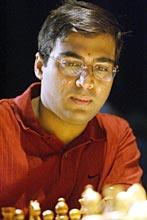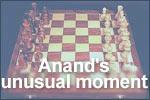
Home > Sports > Specials
The Rediff Special/Faisal Shariff
'Chess as a sport is getting younger'
December 26, 2003
It is a festive afternoon at Mumbai's Sydenham College. Chess wizard Vishwanathan Anand, on a promotional visit for NIIT to support World Computer Literacy Day, is playing 23 young college champions simultaneously. Nothing extraordinary for the Grand Master, except that the competitor in him wakes up at the sight of a chessboard.  Gone is the smile from his face. The competitive edge surfaces as he makes a move and instantly looks up at his opponent. Gone is the smile from his face. The competitive edge surfaces as he makes a move and instantly looks up at his opponent.
"You can get some information about your opponent's mood; to check how happy or confident the player is, whether he is bluffing. You can read quite a lot," explains Anand. The function over, I travel with the Chennai-born genius down in his car along Mumbai's most famous promenade, the Marine Drive, as the vivid orange sunset lights up the sky. The year 2003 has done the same for Anand's career. He won six of the nine events he entered and has been nominated for the year's chess Oscar, the highest award in the game, which will be announced in February 2004. "This year has been up there," agrees Anand. "Last year was one of the best, but this year has been better. I'm doing more good years than bad. Since 1997 to 2003, all the years have been exceptionally good." Unlike in other sports, it is said that in chess one gets better with age. But Anand disagrees with the assumption. "Chess as a sport is getting younger and younger," he says. "It is normal that as you get older your ability for calculations goes down. The sport is getting younger. My rivals are spotting me six-seven years. In chess, age, up to when you can keep fighting at the top, is more than in other sports. But it is coming down faster." There is no doubt that Anand is always moves ahead of the rest in the game of 64 squares. Before one can follow up with another question, he continues, "I work out at the gym, try to take lots of walks, and keep my weight under check. Chess is energy-sapping. You play quite intense all the time and prepare a lot."  Before Sachin Tendulkar captured the people's imagination, Anand was India's boy wonder. At 16 he became the youngest national champion. Two years later, he was the first Asian to win the world junior title at Baguio City in the Philippines. Before Sachin Tendulkar captured the people's imagination, Anand was India's boy wonder. At 16 he became the youngest national champion. Two years later, he was the first Asian to win the world junior title at Baguio City in the Philippines.
So, after 20 years of competitive chess, winning the World Championship in 2000 and two back-to-back chess Oscars, what keeps the flame burning? "All I need is to enjoy myself," he replies. "I like to be happy at tournaments; happy to play chess. I don't need motivation. I should be in the mood to play and looking forward to a match. That is enough motivation for me." After winning every conceivable Indian sporting accolade, from the Arjuna Award to the Padma Shri, Rajiv Khel Ratna and Padma Bhushan, Anand was recently conferred the 'Jameo de Oro', one of Spain's highest civilian awards for a foreigner. He offers an exaggerated nod, an odd smile, but remains mostly impassive as he awaits the next question: why are most world champions of Indian origin based overseas? "It is the nature of the sport," he explains. "Before I went to Spain I was doing nine months of travelling. Ninety per cent of tournaments happen in Europe and Russia. So you need to go there and interact there. Hopefully, if there are more tournaments here in India I will stay back more often. Playing chess here will help. Ditto for tennis. [Mahesh] Bhupathi and Leander [Paes] spend 99 per cent of their time around the world because that's where the tournaments are held. I spend all my time in Europe." Anand believes there is a lot of talent in the country that needs to be groomed. Though he refrains from drawing a blueprint for this, he hopes to help players with their game at some stage. "I won't outline some path to follow," he says. "Each one should find their way. It is best for any sport when things happen spontaneously.  "It's a new era. Things are changing very fast. Everyone getting into the swing of things will help. Someone new will arrive as a role model and that will be the main thing." "It's a new era. Things are changing very fast. Everyone getting into the swing of things will help. Someone new will arrive as a role model and that will be the main thing."
Anand believes that some world-class tournaments in India, backed with good sponsorship, can be the key to increasing the popularity of the game in the country of its origin. "Lots of companies are ready to help players around," he says. "I think more players could get some support. When I was playing there was no support." Anand adds that information technology has revolutionised the sport in the last 15 years. "Databases since 1986 have changed the game fundamentally and brought about a sea change." As Anand's patience wears thin, after a million interviews over the last week, I ask him the 'done to death' question: his favourite chess player. "I don't think on those lines," he answers. "Difficult to compare someone today to someone who travelled two weeks by steamboat for a week-long tournament and then travelled another two weeks to go back." After a few minutes of cajoling, however, Jose Raul Capablanca, Bobby Fischer, Mikhail Nekhemievich Tal and Garry Kasparov are the names he throws up. The role model that he is for millions, I ask him what worries him most about India.  "In general, I'm happy with the way the economy is going. I'm not a Socialist. I believe that you have to create wealth before you distribute it. But it's a tough time for the country. Lot of people are getting left behind. The environment is doing badly. The population is not slowing down, and the two are connected. These are worrying factors. But I would like to work with poor and handicapped children after I slow down. "In general, I'm happy with the way the economy is going. I'm not a Socialist. I believe that you have to create wealth before you distribute it. But it's a tough time for the country. Lot of people are getting left behind. The environment is doing badly. The population is not slowing down, and the two are connected. These are worrying factors. But I would like to work with poor and handicapped children after I slow down.
"One of the nice things is that chess is a great sport for them. It is easy to get out there and play them. If I can do that it will be great." Surely, he has already started doing his bit for society.
|